2017-18 Premier League DARTS, Week 26: Liverpool and Tottenham, wondergoals and controversies
Welcome to Premier League DARTS, FC Yahoo‘s weekly EPL column that will run every Monday morning. Why “DARTS”? Because Henry Bushnell will recap the weekend’s biggest games with Discussion, Analysis, Reactions, Takeaways and Superlatives. All of that is below. But first, a brief intro …
The worst part about Harry Kane’s 95th-minute equalizer at Anfield on Sunday wasn’t the controversy behind it. It wasn’t the sense of injustice, nor the exasperation. It was the narratives denied.
For 15 mad minutes, they had been teased, one after the other, and they were far more satisfactory. First, Victor Wanyama was the unlikely hero. Then Spurs were the beneficiaries of a proper refereeing controversy, only to see Kane spoil that ending. And finally, Mo Salah had offered the latest evidence of his divinity, weaving through Tottenham bodies like only Lionel Messi previously could. Now that was a story everybody, Spurs fans aside, could have latched onto.
And they had latched on, only to have it pried away by another penalty, a routine Kane conversion, and a split decision that more or less left the Premier League table as it was.
And so here we are. The 90-plus minutes ended Liverpool 2, Tottenham 2, Worldies 2, Refereeing Controversies 2, and all four sides of the scoreline deserve a piece of the postgame discussion pie. But the most compelling discussion is of the penalties, so that’s where we’ll begin.
1. Penalty decision No. 1, correct but wrong
As PGMOL admitted, and as ESPN’s Dale Johnson explained here, everything about John Moss’s decision to award Tottenham its first penalty was technically correct. Kane was in an offside position when Dele Alli released the through-ball, yes, but before he received it, Dejan Lovren had made contact with the ball after a deliberate attempt to play it.
Den är fett svår. Om man även tar in att Kanes rörelse (iofs nästan samtidigt när Lovren slänger sig) så borde det påverka spelet och fördel.
Jag tror man kan döma det hur som helst här och få rätt. pic.twitter.com/PL621fxVBt
— Mohamed Scott (@astufftnick) February 5, 2018
Lovren’s intent wasn’t to help the ball on into Kane’s path, but that doesn’t matter. A player must gain an advantage from being in an offside position to be guilty of the transgression, and the offside law specifies: “A player in an offside position receiving the ball from an opponent who deliberately plays the ball … is not considered to have gained an advantage.”
Moss, therefore, isn’t at fault. But the officials who wrote the offside law are. Because in this case, it doesn’t accurately reflect the spirit and purpose of the rule.
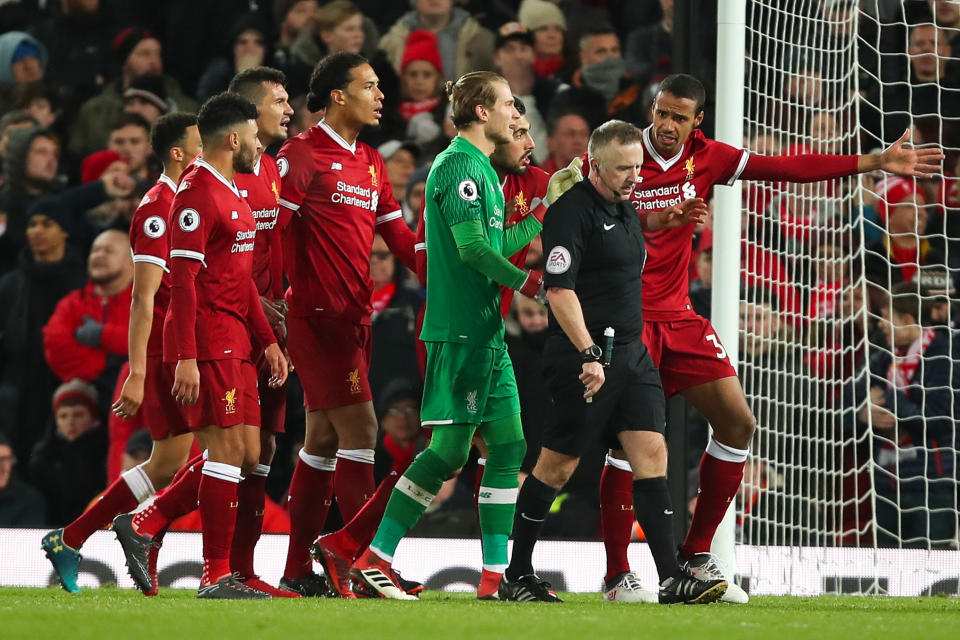
By any non-technical interpretation, Kane does gain an advantage from his position. The rule is designed to strip away that advantage. It shouldn’t force a defender to decide between attempting to play a ball (and thus risking a Lovren situation) and letting it run in the hope that an attacker is offside. It should benefit the defender regardless of his or her decision.
By standing behind a defender (in an offside position) and forcing him or her into that decision, the attacker is involved in the play. Kane is interfering with the decision-making processes involved in the play. He might as well be “challenging for the ball,” which does constitute an offside offense, because if Lovren doesn’t execute the clearance, Kane wins the ball. If the law doesn’t reflect that, there’s a problem. And it’s an exploitable one.
2. Penalty decision No. 2, incorrect but right
So to recap, the first penalty call was problematic but technically correct. The second, in a way, was the corollary. Technically, it probably shouldn’t have been given. But no complaint about it is valid.
Virgil van Dijk’s challenge on Erik Lamela was a foul. That aspect of the play isn’t debatable. It doesn’t matter that Lamela was looking for the contact. It doesn’t matter that he accentuated it with a dramatic reaction. There was contact, and it was sufficient for a penalty.
The issue is that Lamela was offside – barely.
Turns out Lamela was offside as well. Quality. Cheers lino mate. Great stuff. pic.twitter.com/9zJv4nBsyU
— Empire of the Kop (@empireofthekop) February 4, 2018
There is very little gray area on a play like this. It’s offside. End of discussion.
That said, 0.1 percent of fans noticed this live. Very few even saw it on replays before broadcasts paused them at the critical moment and brought technology to the table. The assistant referee, clearly, had none of this at his disposable. And he’s supposed to give benefit of the doubt to the attacker. It’s therefore unfair to blame him, and unfair to have qualms about the equalizer.
3. VAR’s potential utility
VAR would have overturned the second call and upheld the first. But both reinforce its utility.
The value of VAR is twofold. It corrects clear and obvious errors, but also provides referees with additional information to make subjective calls – information that refs often don’t have.
Moss, in his conversation with near-side assistant Eddie Smart, admitted to not having sufficient information to award the first penalty. “Did Lovren touch the ball?” Smart asked, a question on which the call depended. “I don’t know,” Moss responded. Later, he said, “I have no idea … to be honest with you.”
It was an admission Moss surely wouldn’t have made had he known TV microphones were picking up his every word. But it was a revealing look at refereeing. Even the best can’t see everything. They often are forced to guess based on various inconclusive clues. VAR can’t perfect a ref’s judgement, but it can at least strip a lot of guesswork out of the job.
4. The emptiness of Liverpool complaints
So, after 600 words of ref talk, we’ve come to the conclusion that there should be less ref talk, and more football talk. Got it?
Got it. Let’s talk about football. Let’s talk about a two-sided game that justifiably ended level. That was influenced by refereeing decisions, but not defined by them. Many moments of chance and luck contribute to every final score. The penalties, and Kane’s miss, were no different. But they were a few of many in a game controlled by Spurs, heavily influenced by an early mistake, and balanced out by Liverpool’s counterattacking threat.
Had these two sides put in 10 similar performances against each other, they likely would have won three apiece and drawn four. Both were impressive, and both look increasingly likely to finish in the top four.
5. The strength and pliability of Tottenham’s attack
Since the start of the festive period, Tottenham has been the best team in the Premier League. It has won the most points. It has, per Understat, accumulated the most Expected Goals, and the fewest Expected Goals against. Mauricio Pochettino has scrapped the ill-advised three-man defense in favor of his customary 4-2-3-1, and Spurs have been largely excellent since re-finding their rhythm.
A key feature of their success is their pliable, multifaceted attack. And a key feature of that attack is Heung-Min Son. The Korean allows Kane to be himself. Kane isn’t a “traditional” No. 9, in that he isn’t just going to play off the shoulder or on the hip of a center back. He can come deep and take on playmaking responsibility as well. And when he does, crucially, Son gives Spurs necessary verticality:
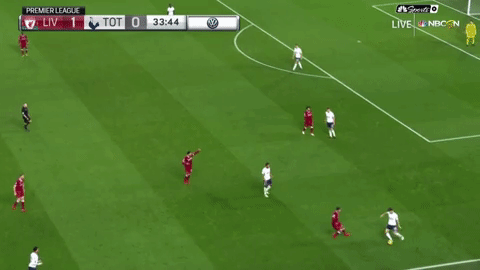
He also pops up all over the field. Spurs are most dangerous when they stretch opponents. To do so, they often drawn them in with overloads, only to explode into vacated space. In the second half on Sunday, Son, Alli and Christian Eriksen – the 3 in the 4-2-3-1 – all came to the same side of the field to leave Liverpool with more players to mark than markers available:
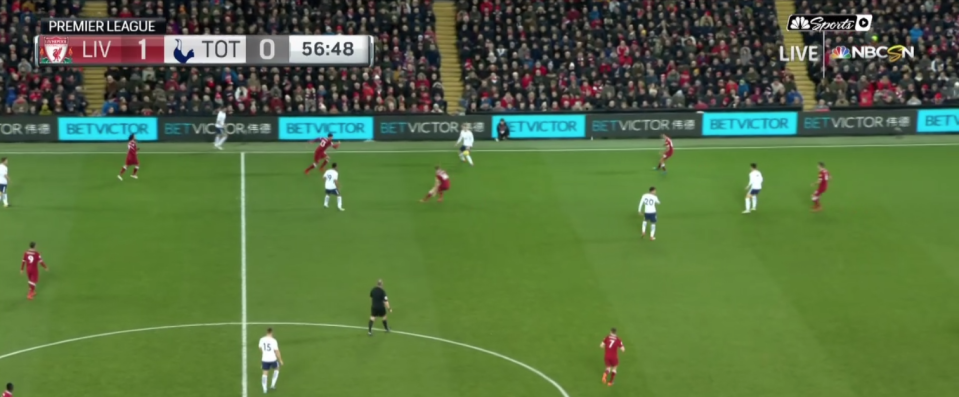
They combined to create a big chance for Son:
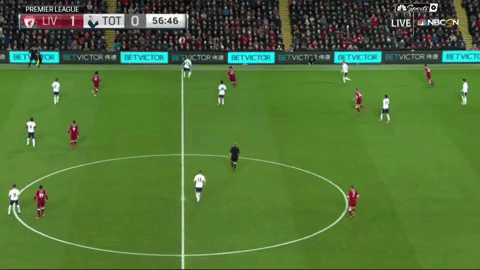
6. Recommended reading
Harry Kane in the Players’ Tribune on Monday, the day after scoring his 100th Premier League goal.
7. Arsenal is going to win the league
Chill. Sarcasm. But based on the response to Arsenal’s 5-1 thrashing of Everton, which featured Mesut Ozil, Henrikh Mkhitaryan and Pierre-Emerick Aubameyang as a trio for the first time, you’d be forgiven if you thought you heard that declaration.
Let this serve as a reminder that overreactive optimism is a pivotal phase of the Arsenal Crisis Cycle. A fan based starved of positivity finally finds some. And it feasts. It forgets about its team’s many flaws, only to be painfully reminded weeks later.
Saturday was a high-end outlier, one of many over the past decade under Arsene Wenger. It was one game, though, not a defensive revamp or midfield restructuring. Wenger still has zero top-class holding midfielders, an aging back line whose talent level doesn’t belong in the top six, and a short-term contract whose expiration should kick-start a rebuild.
But hey, who am I to fault fans for gorging on optimism? Go crazy, Gunners. Just don’t claim you weren’t warned when Arsenal loses to Brighton next month and falls further out of the top-four race.
8. Chelsea’s manufactured crisis
Chelsea’s determination is remarkable. It is dead-set on a dramatic descent from default top-four lock to embarrassment. This is a crisis, if you want to call it that, unnecessarily manufactured from within.
The Blues’ title defense didn’t have to come to this – to consecutive defeats to Bournemouth and Watford, and to diminishing Champions League qualification hopes. But it has, because Antonio Conte will tell anybody willing to listen that it was destined to. He has enough talent, but he’ll tell anybody willing to listen that he doesn’t. The club’s back-room operators haven’t given in to his every demand, and Conte has taken every chance he’s had to implicitly confirm that rumblings of a rift are very much true.
His team’s many on-field flaws haven’t been enough to sink the season, so the Italian has taken matters into his own hands. He’s taken a stunningly pessimistic (and public) view of the club’s fortunes to ensure they’re nosediving. Now that they are, he’s essentially saying I told you so.
The players might bounce back, but Conte and his relationship with Chelsea seem untenable. It’s the equivalent of an unhealthy romantic relationship. There are reasons it came together, and reasons it flourished, but also reasons both parties will soon be better off without it.
9. Bad Boy Troy Deeney
Speaking of determination, Troy Deeney keeps going to new lengths to feed his reputation as a Premier League bad boy. In the past, he has said Arsenal doesn’t have “cojones” and choked out Joe Allen. Now he’s flipping off fans for no good reason after goals:
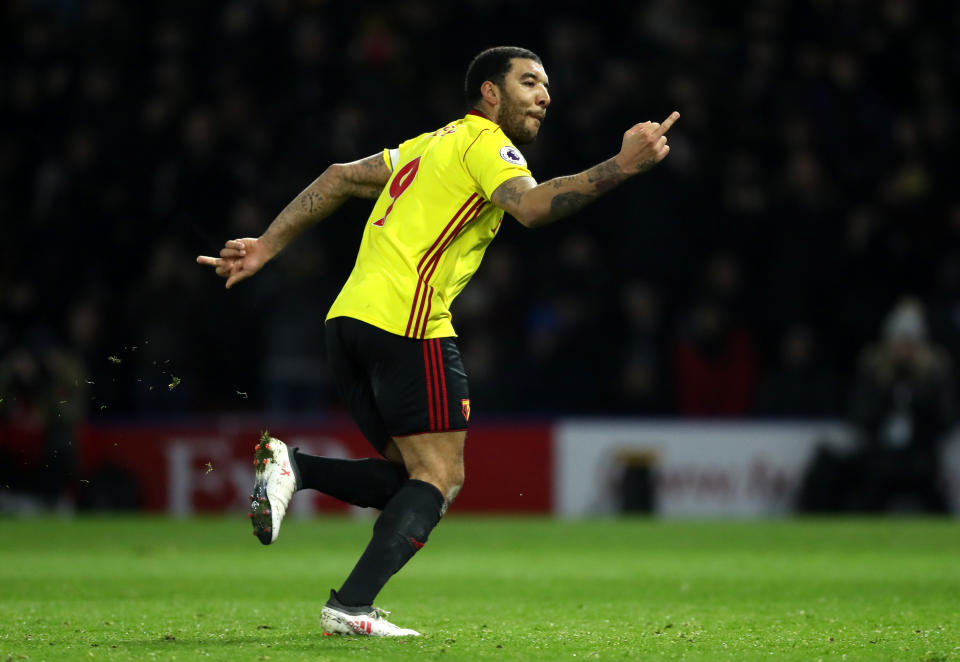
10. Take your pick: Wanyama or Salah?
Not the players, silly. The goals. Which was better?
Your answer says a lot about your soccer fandom. It’s the classic debate, the screamer vs. the ballet. The former is more arousing. It’s ferocious. It’s the moment you watch the sport for, the unleashing of pent-up emotion. The latter is performance art. It’s for the connoisseurs. The degree of difficulty isn’t necessary higher, but the list of capable artists is shorter.
Neither taste is fundamentally better or purer. I enjoyed Wanyama’s goal more in the moment. But looking back, I’ll take Salah’s any day.
Previous DARTS: Week 1 | 2 | 3 | 4 | 5 | 6 | 7 | 8 | 9 | 10 | 11 | 12 | 13 | 15 | 16 | 18 | 19 | 20 | 22 | 23 | 24
– – – – – – –
Henry Bushnell covers global soccer, and occasionally other ball games, for Yahoo Sports. Have a tip? Question? Comment? Email him at henrydbushnell@gmail.com or follow him on Twitter @HenryBushnell.



